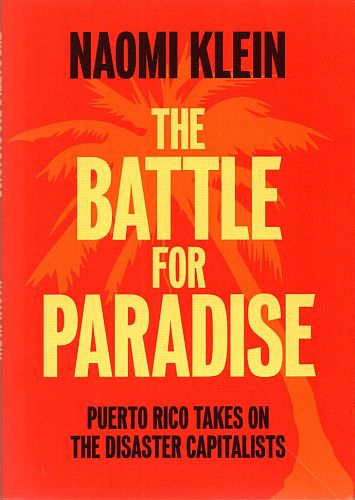

| THE BATTLE FOR PARADISE Puerto Rico Takes on the Disaster Capitalists Naomi Klein Chicago: Haymarket Books, 5 June 2018 |
Rating: 5.0 High |
|||
| ISBN-13 978-1-60846-357-2 | ||||
| ISBN-10 1-60846-357-5 | 80pp. | SC | $9.95 | |
This short book gives us an essential overview of what was happening in Puerto Rico almost a year after Hurricane Maria laid the island to waste. The picture is one of inadequate response, but of resilient local communities coming together to solve the problems caused by the storm — and in a few cases to prosper.
When the author visited for a week in January 2018, those problems remained formidable.
The residents of Puerto Rico face another problem too. That, the author tells us, is the plan some call "Puertopia." In essence, it proposes to turn the island into a playground and tax haven for the wealthy. But, as she points out, efforts to tailor Puerto Rico's economy to favor imported Norteamericanos over natives, a vestige of colonial attitudes, have a long history. Only one aspect of "Puertopia" is novel: the call to make the island a center for cryptocurrency generation. Generating (or "mining," to use the term in vogue) cryptocurrency consumes a lot of electricity. Doing it where electricity rates are high makes little sense. And doing it mostly with fossil-fuel electricity, which is at least the default assumption for Puerto Rico, contributes to global warming.
This neocolonial scheme is opposed by the approach Naomi Klein favors. That involves redesigning the island for the benefit of its native majority by fostering renewable energy rather than fossil fuels, indigenous plants for local consumption rather than mono-crops for export, and overall autonomy. Details are sketchy, since the book was written in a hurry. But a crucial point is that Puertopia is also in a hurry, and hell-for-leather development with political support and lots of capital behind it can move fast indeed.2
"Capital is fast. Unencumbered by democratic norms, the governor and the fiscal control board can whip up their plan to radically downsize and auction off the territory in a matter of weeks—even faster, in fact, because their plans were fully developed during the debt crisis. All they had to do was dust them off and repackage them as hurricane relief, then issue their fiats." – Page 74 |
At eighty numbered pages, the book is a quick read. It is well written, with only a few typos. I found no factual misstatement.3 A Foreword written jointly by five professors briefly explains the need for pro-resident reform in Puerto Rico, the nature of Naomi Klein's visit, and the organization that resulted. That organization, JuntaGente, gets all the royalties from sales of The Battle for Paradise. I recommend the book.

 To contact Chris Winter, send email to this address.
To contact Chris Winter, send email to this address.